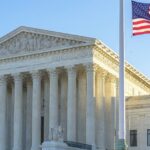




Representative Jasmine Crockett (D-TX) has unleashed a verbal storm on CNN, branding President Donald Trump’s return to the Oval Office as America’s sole emergency.
Breitbart reported that during her Wednesday appearance on CNN’s “The Source,” Crockett didn’t hold back, accusing Trump of wielding emergency powers to seize control of Washington, D.C., target Los Angeles, and meddle with tariffs, all while painting him as a one-man crisis factory.
Crockett insists the only true disaster is Trump’s comeback to power. She’s not mincing words, arguing this return is the root of every drastic move he’s made.
Next up, Crockett pointed to Trump’s invocation of emergency powers to take over Washington, D.C. She sees this as a dangerous precedent, a federal overstep that could trample local authority. But couldn’t this also be viewed as a decisive move to ensure stability in a chaotic capital?
Then there’s the eyebrow-raising mention of Trump “invading” Los Angeles under the same emergency banner. While Crockett frames it as an authoritarian flex, one might argue it’s a bold step to address urban challenges that local leaders have struggled to solve.
Crockett also tied Trump’s return to his use of the Enemy Aliens Act, suggesting it’s a direct consequence of his leadership style. Critics might see this as fear-mongering, but supporters could counter that such measures are necessary in times of heightened national security concerns.
Don’t forget the tariffs—Crockett claims Trump has invoked emergency powers there too, adding fuel to her argument that he’s creating problems rather than solving them. “He is the only one who is creating the crisis,” she declared. Yet, aren’t tariffs often a tool to protect American jobs, even if they come with short-term pain?
Speaking of crises, Crockett’s rhetoric paints Trump as a chaos architect, with every policy move a deliberate attempt to upend democracy.
While her fervor is clear, it’s worth asking if this isn’t just partisan hyperbole. After all, emergency powers have been used by presidents of both stripes when the stakes are high.
Host Kaitlan Collins brought up a fair point, questioning whether Republicans would back a federal takeover of D.C. police, especially with Democrats in the minority. It’s a practical concern—without bipartisan support, such moves could stall. But doesn’t history show that party loyalty often trumps principle when the chips are down?
Crockett didn’t shy away from slamming Republicans, accusing them of ignoring the law and the Constitution in their support of Trump. “I think that the Republicans couldn't care less about the law,” she snapped. While that’s a spicy jab, it’s hard to deny that both sides have bent rules when it suits their agenda.
She did nod to the minority leader’s stance, noting a commitment to involve the courts and comply with legal obligations if Trump oversteps.
It’s a small olive branch, suggesting some faith in checks and balances. But in a polarized climate, will court battles just become another partisan circus?
Let’s circle back to her D.C. takeover critique: Crockett argued that Trump’s actions signal a presidency built on emergency decrees.
“The fact that he’s taken over D.C. in the first place, invoking emergency powers, that is what he wants to do his entire presidency,” she warned. If true, that’s a chilling prospect—but isn’t strong leadership sometimes mistaken for overreach?
Crockett’s broader plea is for a return to what she calls “actual democracy,” free from emergency-driven governance.
It’s a noble sentiment, but one might wonder if her definition of democracy conveniently excludes policies she dislikes. The irony is, democracy often thrives on debate over tough, unpopular decisions.
Ultimately, Crockett’s CNN appearance was less an interview and more a rallying cry against Trump’s leadership. Her list of grievances—D.C., Los Angeles, tariffs, and the Enemy Aliens Act—paints a picture of a president unbound by norms. Yet, for every alarm she sounds, there’s a counterargument that these are calculated moves for America’s good, not its ruin.
So, where does this leave us? Crockett’s warnings resonate with those wary of centralized power, but they risk alienating folks who see Trump’s actions as necessary, even patriotic.
In a divided nation, her words are less likely to bridge gaps and more likely to deepen trenches—though, to her credit, she’s fighting for what she believes.



